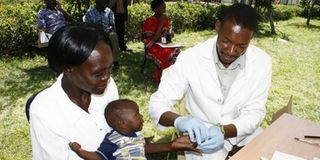Vaccine raises hope in war on pneumonia

A woman is tested for malaria during a Kenya Medical Research Institute (Kemri) open day. FILE PHOTO |
What you need to know:
- Pilot project proves efficacy of PCV10.
- Ministry accepts drug produced by Kemri to help fight deadly disease.
Preliminary data from the impact study on the Pneumococcal Conjugate Vaccine (PCV10) shows a sharp decline in Invasive Pneumococcal disease in Kilifi County.
According to the study carried out by researchers at the Kemri-Wellcome Trust, the PCV10 vaccine was also found to reduce the number of hospital admissions with pneumonia by a quarter among children under five years.
Dr Collins Tabu from the Unit of Vaccines and Immunisation Services in the Ministry of Health said that the results from the study showed that the vaccine was effective in preventing pneumonia in children.
He was speaking at the Windsor Golf and Country Club in Nairobi during a recent meeting with policy makers, experts and other stakeholders, to develop a policy for sustained financing of the immunisation.
“Evidence from Kemri Welcome Trust Kilifi and Kemri Centre for Disease Control in Kisumu have shown the efficacy of the vaccine. We have seen a 50 per cent reduction in the number of severe pneumonia cases.
“Caring and rehabilitating pneumonia patients costs millions. Usually the patients cannot breathe well, they gasp for air and must be put on ventilators. However, costs would be cut by use of the Sh700 vaccine,” he said.
Dr Tabu said free vaccines that were administered on children during a pilot project were paid for by partners.
A dose of PCV10 was being sold at Sh700 when it was introduced four years ago, and costs might rise, he said.
“The vaccine is expensive to administer free. Sh3.5 billion is required for a population of 1.5 million children, who receive three doses each,” he said.
Dr Tabu said the ministry had mapped informal settlements and planned to conduct an immunisation drive there.
“The reduction in the number of deaths by close to 30 per cent in infants is as a result of immunisation. More than 80 per cent of children are immunised by their first birthday,” said Dr Tabu.
Pneumonia kills 30,000 children each year, and many more are left with permanent disabilities, according to a report released during World Pneumonia Day in November last year by the Institute for Health Metrics and Evaluation.





